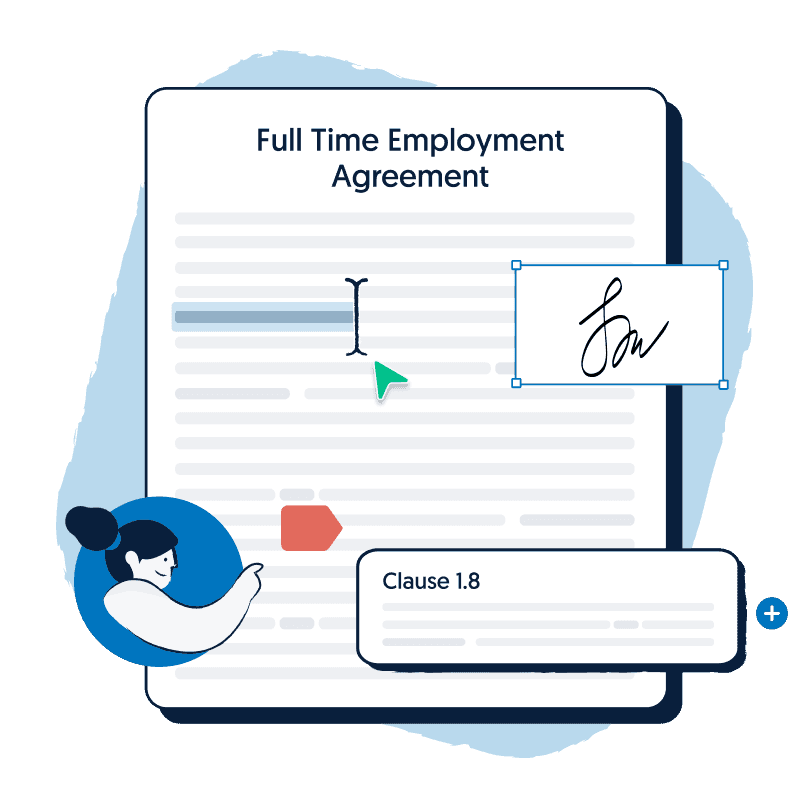Individual flexibility arrangements (IFAs) provide alternative work arrangements. The employer and the employee benefit from such arrangement as the needs of both parties are communicated and considered. Implementing IFAs provides for greater flexibility in the workplace, reduces employee turnover rates and improves overall job satisfaction. This article will provide a legal guide to IFAs and recommendations that can help meet the needs of your business.

Get your Full Time Employment Agreement legal document for free.
What are individual flexibility arrangements?
According to the Fair Work Ombudsman, an IFA is a written agreement between an employer and an individual employee. The purpose of the agreement is to change the effect of certain terms in the employee’s award or registered agreement. Such variations may include, overtime rates, penalty rates, working hours, allowances and leave loading.
However, any changes resulting from an IFA cannot reduce the employee’s entitlements when compared to the original award or registered agreement. In other words, the arrangement must leave the employee better off overall.
It is also important to note the difference between an IFA and ‘flexible working arrangements’. In comparison to IFAs, employees request flexible working arrangements which does not impact the terms within their award or registered agreement. You can read more about flexible working arrangements here.
What are the legal requirements?
All awards, enterprise agreements and other registered agreements have to include an IFA clause. Section 144 of the Fair Work Act 2009 (Cth) (FWA) sets out the legal requirements in implementing an IFA.
Firstly, the employer and employee must genuinely agree upon the IFA. This means that an individual employee has the right to refuse an IFA and will be protected under the FWA. Prospective employees are also covered under the FWA and cannot be forced to sign an IFA as a condition of employment.
Secondly, there are certain formal requirements that have to be met. An IFA must:
- be in writing and signed by the employee and the employer. If the employee is under 18 years of age, a parent or guardian must sign
- include a copy that sets out the terms of the IFA and is given to the employee
- identify the terms on how the IFA may be terminated by either the employer or employee
Finally, the employer is responsible for ensuring that the IFA will not reduce the employee’s work entitlements and that the employee will be better off overall. This involves comparing the employee’s entitlements under their award or registered agreement as well as weighing up the advantages and disadvantages of the IFA to the employee. Considerations may include, changes to hours and penalty rates and the increase or decrease in pay.
When can individual flexibility arrangements be terminated?
The employer or employee may terminate an IFA if it no longer meets the needs of the parties. Both parties may propose alternative arrangements and go through the legal process of making an IFA, as mentioned above. However, one party can terminate the IFA by providing notice if an alternative cannot be agreed upon. The party under an award must must provide written notice to the other party within 13 weeks. An arrangement under a registered agreement must adhere to the notice requirements as stated in the registered agreement. Both parties must have a copy of the termination notice for employment records.
An employee may also terminate an IFA and bring an action for compensation if they believe they are being disadvantaged. Although IFAs are not registered under the FWA, the failure to meet the legal requirements in forming an IFA can lead to the employer facing penalties.
Recommendations for Employers
The purpose of IFAs is to attend to the individual needs within the workplace. Therefore, not every IFA policy will look the same. Here are some recommendations for employers that can help incorporate business flexibility that works for you and your employees.
Educating the staff
Employers should ensure that the staff understand the purpose of IFAs and how they can be used in the workplace. As a minimum, this can include mandatory training that covers the requirements under the FWA.
Encourage open discussion
As mentioned above, the employer and the employee must genuinely agree to the IFA. This requires open discussion that considers the particular circumstances of individual employees, as well as the needs of the business. Organising meetings is essential in understanding the different options and ensures that the employee is better off overall in relation to the proposed IFA.
Ensure that all employees understand the terms
Employers are responsible for making sure that all their employees understand the terms of an IFA. For instance, this may require managers to cater for different types of employees, who might be impacted by their age, cultural background or their English proficiency. Employers can attend to these particular needs by arranging an interpreter or providing translated copies of the proposed IFA.
Regular reviews
The circumstances of an employee may change, which may impact the practicality of the IFA. This can include a change in pay rates, a promotion or even when a junior employee has a birthday. It is important that employers regularly review such arrangements to ensure that the employee’s entitlements do not fall below their award or registered agreement.

Get a fixed-fee quote from Australia's largest lawyer marketplace.






